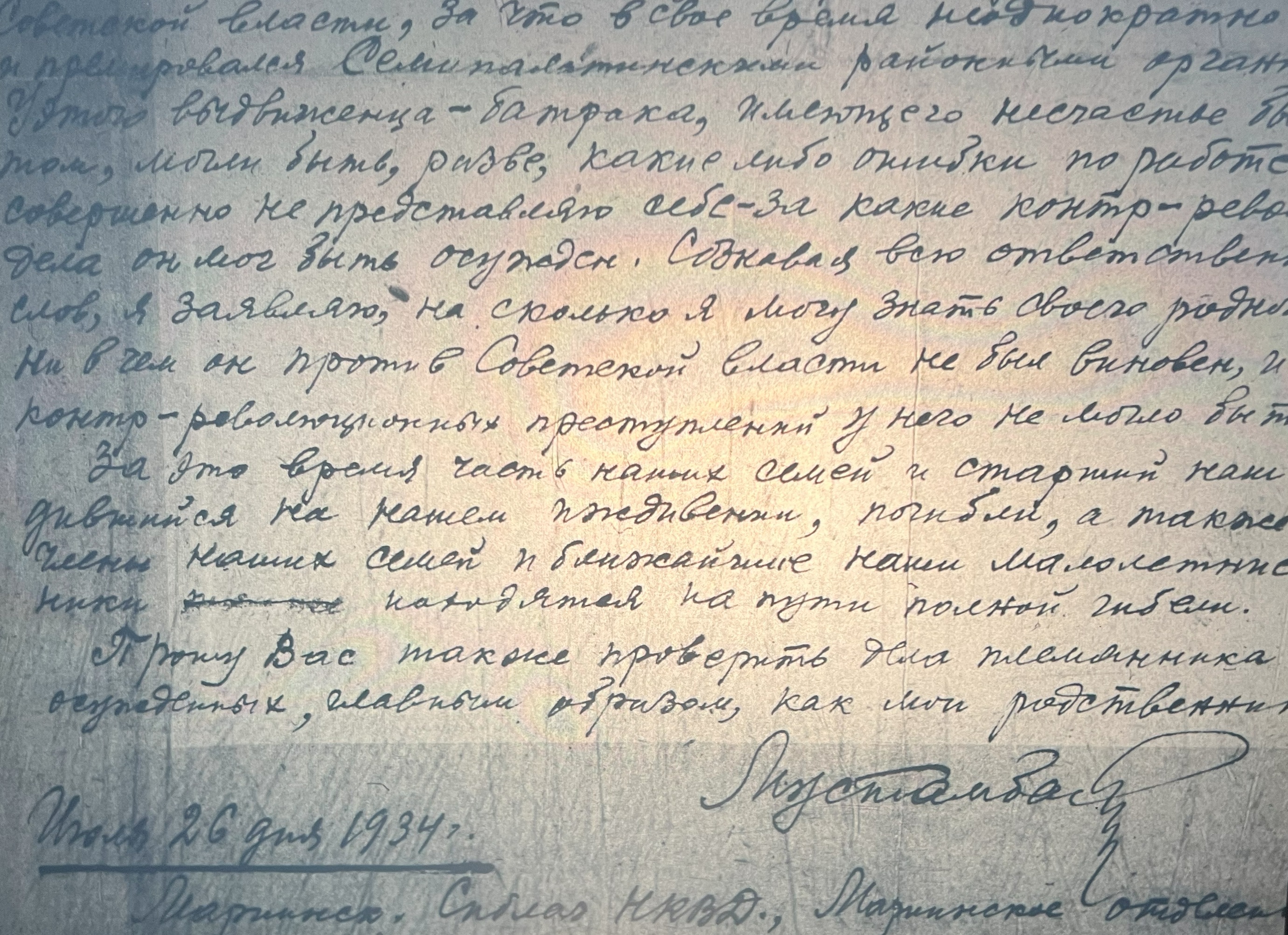Idris Mustambaev: A Personal History Through Ego-Documents
Research article
Views: 186 / PDF downloads: 80 / PDF downloads: 7DOI:
https://doi.org/10.32523/3080-129X-2025-152-3-142-165Keywords:
Idris Mustambaev , Goloshchekin, ego-documents , biography , memory, repression, letters, historical anthropology , personal historyAbstract
This author’s study presents a biographical episode from the life of Idris Mustambaev – a pivotal figure caught in the crosshairs of political repression during the 1930s in the Kazakh ASSR / SSR. The objective of this scholarly publication is to uncover the internal dynamics of party conflicts through the lens of Mustambaev’s personal letter, trace his mental and emotional reactions as a victim of repression, and propose a methodology for analyzing personal narratives within the context of Soviet ideology. The novelty of this research is defined by several aspects. Ego-documents authored by Mustambaev, discovered in the archives of RGANI, are being introduced into academic circulation for the first time, including an original letter addressed to Joseph Stalin and Lazar Kaganovich. These materials complement the letter previously published by M. Koigeldiev and reveal previously unknown biographical details and the intricate struggles within Kazakhstan’s political nomenclature. Particular attention is given to the methodology for analyzing ego-documents, grounded in narrative approaches and Hayden White’s concept of the “linguistic turn.” The author explores and engages with both domestic and foreign theoretical frameworks, enabling an interpretation of the letter not just as a historical source, but as a manifestation of personal identity within a totalitarian system. The findings show that Mustambaev’s ego-documents offer insights into individual perceptions of political repression and highlight strategies for self-preservation and expressions of individuality under party dictatorship. The study demonstrates how a personal letter—marked by editorial nuances and internal logic—becomes a testimony of survival strategy, a form of communication with power, and a resource for historical anthropology. The work expands the scope of autobiographical studies in the Kazakhstani context and contributes to the broader investigation of private and public memory during the Soviet period. Exploring Mustambaev’s personal documents goes beyond biography; it becomes a tool for recovering cultural and familial memory. Incorporating these texts into scholarly discourse not only reveals overlooked chapters of his life but also sheds light on how personal recollections intersect with collective Soviet narratives. His letters encompass not just factual content but represent a confrontation between personality and ideological pressure. These materials open opportunities for a deeper reading of his autobiography through institutional archives of the OGPU, NKVD, and the Gulag, illustrating the complexity of his life trajectory. Crucially, these ego-documents must be approached with a critical lens, as expressions of subjectivity that oscillate between the author’s “I” and external representation. The study raises a methodological dilemma: is Mustambaev the speaking subject of the document, or an object shaped by external narrative forces? This question remains central to ongoing discussions about authorship, narrative construction, and trust in autobiographical sources. Ultimately, the research unlocks new scholarly horizons. Ego-documents offer a gateway into social history, helping break away from official narratives and fostering a fuller understanding of the political destinies of Kazakhstan’s intellectual elite in the mid-20th century.
Downloads
References
Jancke G. Persons, the ‘Autobiographical Person’ and Cultural Concepts of the Person: Early Modern Self-narratives from German-speaking Areas in a Transcultural Perspective. The Medieval History Journal. 2015. No.18(2), pp.346–377. https://doi.org/10.1177/0971945815601307 (in English) DOI: https://doi.org/10.1177/0971945815601307
Schulze W. “Ego-Dokumente: Annäherung an den Menschen in der Geschichte?” In: Ego-Dokumente. Annäherung an den Menschen in der Geschichte. Berlin: Akademie Verlag. 1996. Pp.11–30. (in Deutsch) DOI: https://doi.org/10.1524/9783050047997.11
Алаш ақиықтары: Мақалалар, деректі құүжаттар, аудармалар [Мәтін]: алаш мұрасы. Т.5. Zhurtbay T. (ed.). Almaty: Alash, 2006. 288 p. (in Kazakh)
Amanzholova D. «…Sovsem po- stalinski…»: sovetskaia vlast, ee posredniki i etnopoliticheskaia elita v Kazakhskoi ASSR v 1920-e gody. In: Istoriia narodov Rossii v issledovaniiakh i dokumentakh. In History of the Peoples of Russia in Research and Documents. Moscow: Institute of Russian History. 2014. Pp.5–50. (in Russian)
Arutyunyan N. "Predostavit tekstu prosto byt…": metodologicheskie printsipy issledovaniia ego-dokumentov v rabotakh N. Kozlovoi. RSUH Bulletin. Series: Literary Studies. Linguistics. Cultural Studies. 2019. No.8–2, pp.176–196. (in Russian)
Zhanbossinova A. «Proshu sniat s menia nezasluzhennoe kleimo 58-i stati»: ego-dokumenty v istorii politicheskogo terrora v Kazakhstane. Semey: Intellekt. 2020a. 580 p. (in Russian)
Zhanbossinova A. Pamiat kak travma: vospominaniia zhertv politicheskikh repressii v fokuse ego-dokumentov. In: Ethnography of Altai and Adjacent Regions: Proceedings of the 10th Int. Conf. Barnaul: Altai State Pedagogical University. 2020b. Pp.214–219. (in Russian)
Zhanbossinova A., Zhandybaeva S., Kazbekova A. Ego-dokumenty istorii politicheskogo terrora v Kazakhstane. St. Petersburg University Bulletin. History. 2021. Vol.65, is.3, pp.797–809. https://doi.org/10.21638/spbu02.2025.209 (in Russian) DOI: https://doi.org/10.21638/11701/spbu02.2021.307
Zaretsky Yu. Svidetelstva o sebe: novye issledovaniia gollandskikh istorikov. In: Social History. Yearbook, ed. N. Pushkareva. SPb.: Aleteya. 2008. Pp.329–340. (in Russian)
Zaretsky Yu. Istoriia subieektivnosti i istoriia avtobiografii: Vazhnye obnovleniia. An inviolable reserve 2012. No.3(83), pp.184–199. (in Russian)
Zaretsky Yu. Ego-dokumenty sovetskogo vremeni: terminy, istoriografiia, metodologiia. An inviolable reserve. 2021a. No.3(117), pp.184–199. (in Russian)
Zaretsky Yu. Ego-dokumenty: Rossiia pervoi poloviny KhKh veka v mezhistochnikovykh dialogakh. In: Ego-Documents: Russia in the First Half of the 20th Century in Intertextual Dialogues (Ed. M. Litovskaya & N. Surzhikova). Moscow–Yekaterinburg: Cabinet Scholar. 2021b. Pp.6–28. (in Russian)
Kozlov S. Ego-dokumenty v strukture istoricheskoi pamiati. Bibliosphere. 2022. No 4, pp. 5–11. https://doi.org/10.20913/1815-3186-2022-4-5-11 (in Russian) DOI: https://doi.org/10.20913/1815-3186-2022-4-5-11
Koigeldiev M., Polulyakh V., Tleubaev Sh. (eds.). Krasnyi terror: iz istorii politicheskikh repressii v Kazakhstane (Sbornik dokumentalnykh materialov 20-50-kh godov KhKh veka). Almaty: Alash Publishing. 2013. 384 p. (in Russian)
Surzhikova N. Ego-dokumenty: intellektualnaia moda ili osoznannaia neobkhodimost? In: History in Ego-Documents: Research and Sources. ed. N. Surzhikova. Yekaterinburg. 2014. Pp.6–13. (in Russian)
Ego-dokumenty: Rossiia pervoi poloviny KhKh veka v mezhistochnikovykh dialogakh: [kollektivnaia monografiia]. Litovskaya M., Surzhikova N. (eds.). Moscow–Yekaterinburg: Institute of History and Archaeology of the Ural Branch of the Russian Academy of Sciences. 2021. 408 p. (in Russian)

Downloads
Published
Issue
Section
License
Copyright (c) 2025 Kh. Maslov

This work is licensed under a Creative Commons Attribution-NonCommercial-NoDerivatives 4.0 International License.















